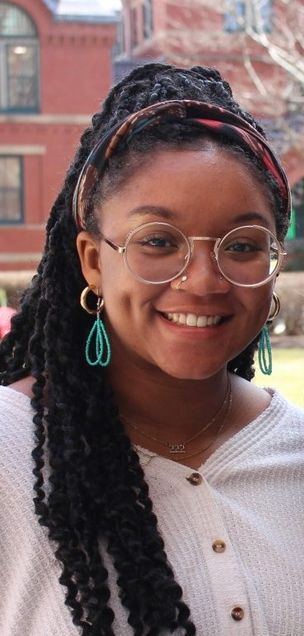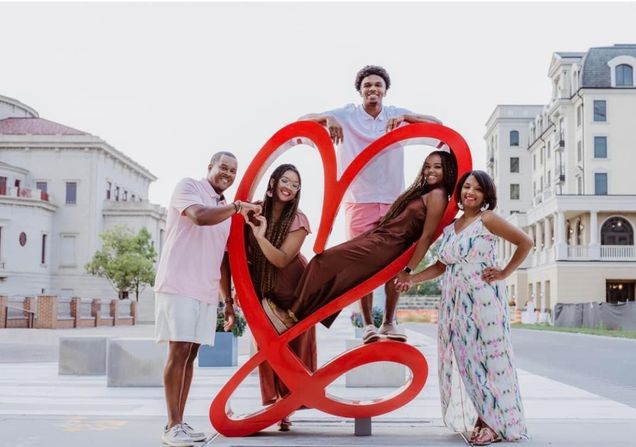GMS Master’s Spotlight: Elena Redmond (BMFS ’24)
 Elena Redmond is a May 2024 degree candidate in the Biomedical Forensic Sciences (BMFS) master’s program. Her thesis research used a high-pressure mass spectrometer to create a library for detecting organic gunshot residue.
Elena Redmond is a May 2024 degree candidate in the Biomedical Forensic Sciences (BMFS) master’s program. Her thesis research used a high-pressure mass spectrometer to create a library for detecting organic gunshot residue.
Aside from her studies, Elena has spent almost two years working as an intern with the GMS Marketing & Communications team, where she took ownership over updating the web calendar, helping with Spotlight articles and assembling the bi-weekly GMS Press newsletter.
Congratulations, Elena! We’ll miss you!
Tell me a bit about your journey to Boston. Are you from the area?
I’m originally from Indianapolis, Indiana. I’ve lived there practically my whole life. Then, I ended up in a small city called Evansville, Indiana, at the University of Evansville for my undergraduate studies in biochemistry and to play volleyball. After my four years there, I decided I wanted something different, including a bigger city. So, here I am in Boston now. At first, it was a big transition for me, and it was a little difficult getting used to a big city, but I am now very accustomed to living here.
What drew you to Boston University and the Biomedical Forensic Sciences program?
A lot of the forensics programs in the United States are on the East Coast, so I already had in mind that I was going to be on the East Coast. Specifically, for Boston and BMFS, it was the Mock Crime Scene House in Holliston that made the program stand out. I thought that was a really cool opportunity, which it was! They also had a lot of different courses that I could take with really talented professors. I was really interested in just diving into a variety of different courses, and valued all the instruments they had, and the labs and hands-on opportunities available.
Did you always know you wanted to study forensics?
I didn’t know that I wanted to do forensics right away, but I’ve always been interested in science. I was that kid in elementary school that carried around random science things and books. I used to have science-themed birthday parties. So, I always knew that I loved science, but I didn’t really know what I wanted to do until, I would say, high school, when I got into forensics.
When my dad and I would travel for volleyball tournaments, and when we were at the hotels, we would just turn on Forensic Files. I was like, “Oh, my gosh! This is so cool!” But I didn’t know it was an actual field you could go into until my last year of undergrad, when I was like, “Oh, I can do this.” That’s when I started applying, and that’s how I ended up here.
Can you tell me about the research you’re doing in the BMFS program?
For my thesis, I used a high-pressure mass spectrometer, called the MX908, by 908 Devices, a company located here in Boston. It’s a field-portable device, and it’s essentially used to detect substances that can be encountered on scene, such as drugs or explosives. Using this device, I created a library of various organic compounds present in gunshot residue and did validation testing to see if the device was able to detect those compounds. Then, I went on to test smokeless powder in ammunition. That’s typically what’s encountered on scene. So, I tested both burnt and unburnt smokeless powder residue. I used the device to test that to see if any organic compounds that I created the library for were detected.
What is the application of your research to the larger field of forensics?
Typically, with gunshot residue, there are two types. There’s organic gunshot residue and inorganic gunshot residue on scene. In all forensics labs, mainly, inorganic gunshot residue is collected and tested, which can be a very time-consuming process. The problem with inorganic gunshot residue is that it can transfer very easily, and it doesn’t have a lot of persistence. So, if someone tests positive for inorganic gunshot residue, it doesn’t necessarily mean that they shot a gun and vice versa. If they test negative, that doesn’t mean that they didn’t shoot a gun. So, organic gunshot residue has lower transferability and higher persistence. If it’s collected on a person, the scientists who are testing for this can have more confidence that the person who is positive or negative is actually positive or negative.
What are your larger goals in the field?
Right now, I’m applying to jobs. I am interested in both crime scene investigation and also forensic chemistry and forensic biology. I’m looking for something that has both, where I can be on scene and also in a lab. Right now, since I am getting into the field, I’m fine with compromising, for just one or the other. Once I have my foot in the door, I can do a little bit more. This summer, I was able to work at the coroner’s office in Indy, and it really solidified my passion for crime scene investigation.
Are there any mentors who’ve helped you get to this point?

I feel like I’m surrounded by a very, very large support system. From my elementary, middle school and high school teachers to my professors at UE and my coaches at UE, and also, my friends, here and at home. Lastly, of course, my family, especially my immediate family. They’ve been there to support me this whole journey, and I don’t know where I’d be without their endless support and guidance.
What advice would you give to future BMFS students?
I would say that it’s okay to have multiple interests within forensics. Sometimes, you can get caught up in the category of like, forensic biology/DNA or chemistry/toxicology. It’s okay to like a little bit of everything and to explore everything, because that’s what you’re here for. So, I would advise them to not just get stuck in a category, and to try to venture out and figure out other things that you like.
How else have you been involved on campus with GMS?
I work for the GMS Communications office. I help with filling up the calendars that everyone sees and Spotlights like this one. I also help with news posts. I mainly work on the GMS Press newsletter that you guys get bi-weekly.
What are your hobbies outside of school and work?
I recently got into roller skating. I’ve fallen a lot, but it’s good to find something that’s a physical activity. After being a student athlete, it’s kind of hard to figure out something to do. So that’s the thing that I’ve found that I really like. And I also really like painting. I have a lot of paintings in my apartment and in my room. I just do it when I’m stressed or bored sometimes. It’s really fun.
Is there anything else you’d like to share?
For people who are trying to figure out if they want to move, I would say, if you have an opportunity to move outside of your state or hometown, even if it’s for a little bit, I would take that opportunity. You can learn a lot about yourself and about people around you and different cultures. I would take that opportunity if you ever have it.